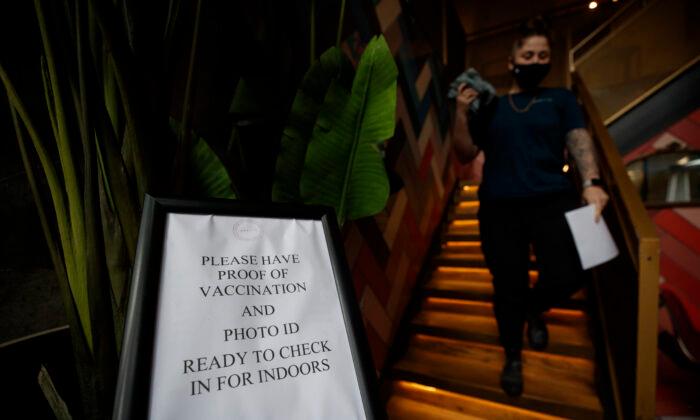Businesses implementing Ontario’s COVID-19 vaccine certificate requirements are seeing decreased sales, according to a survey conducted by the Canadian Federation of Independent Business (CFIB).
Over 60 percent of businesses requiring patrons to show COVID-19 vaccine passports are reporting lower sales “as a direct result” of the provincial government’s vaccination mandates, said Dan Kelly, president and chief executive officer of the CFIB.
Kelly also noted that the extension of the vaccination policy will correspond to increased losses among hospitality, arts, and recreation businesses.
At least half the businesses in both sectors also reported additional costs for staffing and mobile phone hardware or internet services.
Less than 10 percent of the businesses claimed higher sales following the introduction of the province’s COVID-19 vaccination policy.
‘Bitter Pill’ for Businesses
On Dec. 17, the Ontario government further strengthened public health measures in response to the rapid spread of the new Omicron variant, which the CFIB described as a “bitter pill” for many businesses to swallow.“Today’s measures will do nothing to allay the fears that have kept many consumers home, while businesses remain open.”
However, the CFIB said it remains “deeply concerned” that the majority of small businesses needing financial help are excluded from receiving pandemic relief under Bill C-2.
“A full 80 percent of small firms in need of financial support will no longer qualify for wage or rent subsidies due to the new programs’ high thresholds,” the group said.
“As long as there are COVID-related restrictions imposed on their activities businesses should have access to government support programs and governments should do everything possible to avoid imposing cost increases.”
On Dec. 21, CFIB and Restaurants Canada issued a joint statement to all the country’s premiers, urging them to bring back financial support to the majority of small businesses that do not qualify for the restructured benefits.
The coalition called on the federal government to provide additional small business grants, return the wage and rent subsidy to the spring 2021 level, reopen the Canada Emergency Business Account loan program with larger loans, and ensure that new businesses also qualify for relief programs.
“We urge you to ensure public health officials do not heighten the panic and fear among the public. We urge you to reconsider new or existing restrictions. We urge you to lift restrictions at their earliest opportunity.”






Friends Read Free